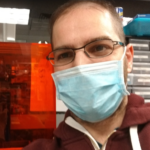
Menu
Symposia
Open Neuroscience: new approaches for new tools
Chairs
Open science is not a field in itself, but rather a scientific methodology. It is critical in multiple research areas, and is particularly well developed in the realm of neuroscience. The hallmarks of this approach are open access to results, shared standards, and unconstrained dissemination of information and methods with the goal of increasing reproducibility and collaboration. Modern neuroscience thrives on creativity and innovation, which involves the communal development of new and better tools, including open source strategies. With this in mind, this symposium will feature speakers covering different areas of neuroscience, ranging from electrophysiology to behavioural approaches, and employing rodents, flies, and humans. Importantly for us, we believe that open science is underrepresented within the Argentinean neuroscience community. Therefore, this symposium represents an opportunity to have a first-hand perspective on the challenges and opportunities of pursuing open science, with a particular focus on the development of tools and software. Furthermore, we believe that open science will be crucial for our community as it can help to overcome limitations of commercial software and hardware such as high prices and low accessibility, and allow everyone to achieve their research goals.
Speakers

High-throughput Monitoring of Insect Behaviours, From the Lab to the Field
QUENTIN GEISSMANN
University of British Columbia
Read More
Organisms are adapted to environments where conditions are largely periodic (e.g. daily, yearly), and therefore partially predictable. They have evolved mechanisms to modulate their physiology and behaviour through time, using their internal clocks to effectively ‘model’ the future state of their environment. The study circadian insect behaviours has been limited by our methodological ability to classify and quantify behaviours over long durations, for a large number of individuals. I will present two open-source and high-throughput methods based on raspberry pi cameras that were built to address these limitations. First, the Ethoscope, which is primarily developed to study sleep in the laboratory. Second, the Sticky pi, a smart insect trap that can score when, where and which insects are active. I will use these two tools as examples to highlight the tremendous opportunities that, as a scientific community, we are given to develop, share and adapt both hardware and software. Such collective and distributed ownership of open research tools, I will argue, often leads to very innovative research.

Open source hardware for behavioral neuroscience research
LEX KRAVITZ
Washington University in St Louis
Read More
Neuroscientists often invent new devices and methods to further their experiments. Recent developments in prototyping and fabrication such as 3D printing, laser cutting, and production of custom printed circuit boards have lowered the bar to entry for designing novel hardware. This has produced a wave of open-source hardware devices that have enabled new experiments and answers in neuroscience research. The Kravitz Lab has developed several devices for measuring rodent behavior including smart pellet dispensers, embedded video tracking cameras, and home-cage based activity sensors. This talk will review the development and use of these devices, and provide an overview of the motivation behind producing and sharing open-source hardware for neuroscience research.

Open-source tools for systems neuroscience
JAKOB VOIGTS
MIT, Open Ephys.
Read More
Open-source tools are gaining an increasing foothold in neuroscience. The rising complexity of experiments in systems neuroscience has led to a need for multiple parts of a setup to work together seamlessly, which means that open-source tools that expose more interfaces and can be understood and modified more easily have an advantage and allow scientists to conduct better experiments with less effort than closed tools. Open Ephys is a nonprofit with team members distributed all around the world. Our mission is to advance our understanding of the brain by promoting community ownership of the tools we use to study it. We are making and distributing cutting edge tools that exploit modern technology to bring down the price and complexity of neuroscience experiments. A large component of this is to take tools that were developed in academic labs and helping with documentation, community support, and distribution. More recently, we have been working on establishing standards that make it possible to combine many existing experimental methods, such as miniaturized microscopes, electrode drive implants, or silicon probes seamlessly in one system. In the longer term, our development of new tools, interfaces and our standardization efforts have the goal of making it possible for scientists to easily run complex experiments that span from complex behaviors and tasks, multiple recording modalities, to easy access to data processing pipelines.

Just Another Tool for Online Studies": An open-source tool to conduct cognitive science experiments online.
ELISA FILEVICH.
Humboldt-Universität zu Berlin.
Read More
Behavioural data collection for cognitive (neuro)science traditionally takes place in a physical laboratory environment: participants come to the lab, receive instructions from an experimenter and complete a computer-based task. This provides high control over stimulus presentation and participants’ behaviour, but also comes at a very high cost in time and money. This naturally sets a limit to the number of participants that can be collected, and is one of the factors contributing to the reproducibility crisis in the field. As an alternative, in cases where only behavioural data are collected, experiments can be conducted online, with participants performing cognitive tasks from their homes and submitting result data through the Internet. This dramatically decreases the time and costs required to collect a full dataset, in turn allowing for larger, more diverse —and thus more representative— samples than the common sample of university students.
We have developed an open-source web application to assist in setting up a server for online data collection (JATOS, jatos.org). JATOS supports online studies, including longitudinal and group studies. I will detail the requirements to run a study online, and describe the most common tools available to build and and run studies online. I will also give an overview of the advantages and (more importantly), limitations of collecting data online.

